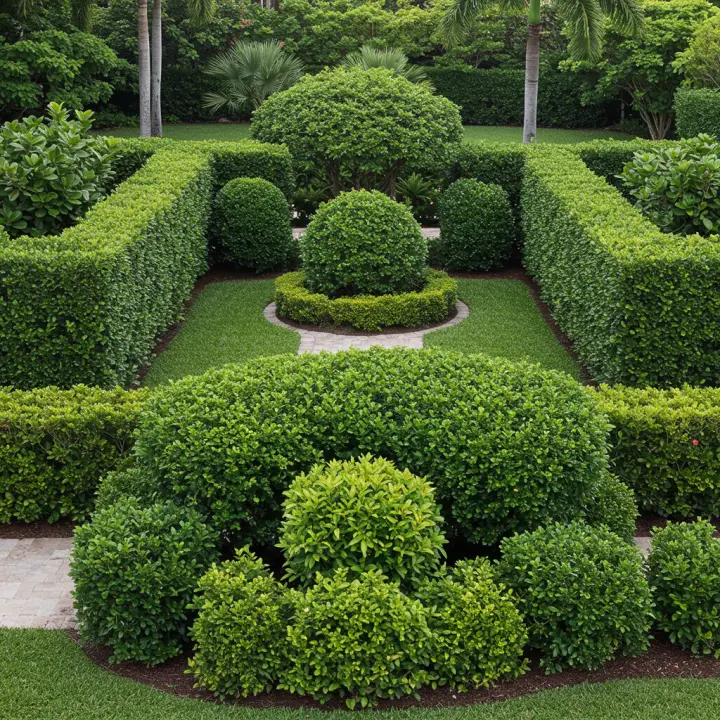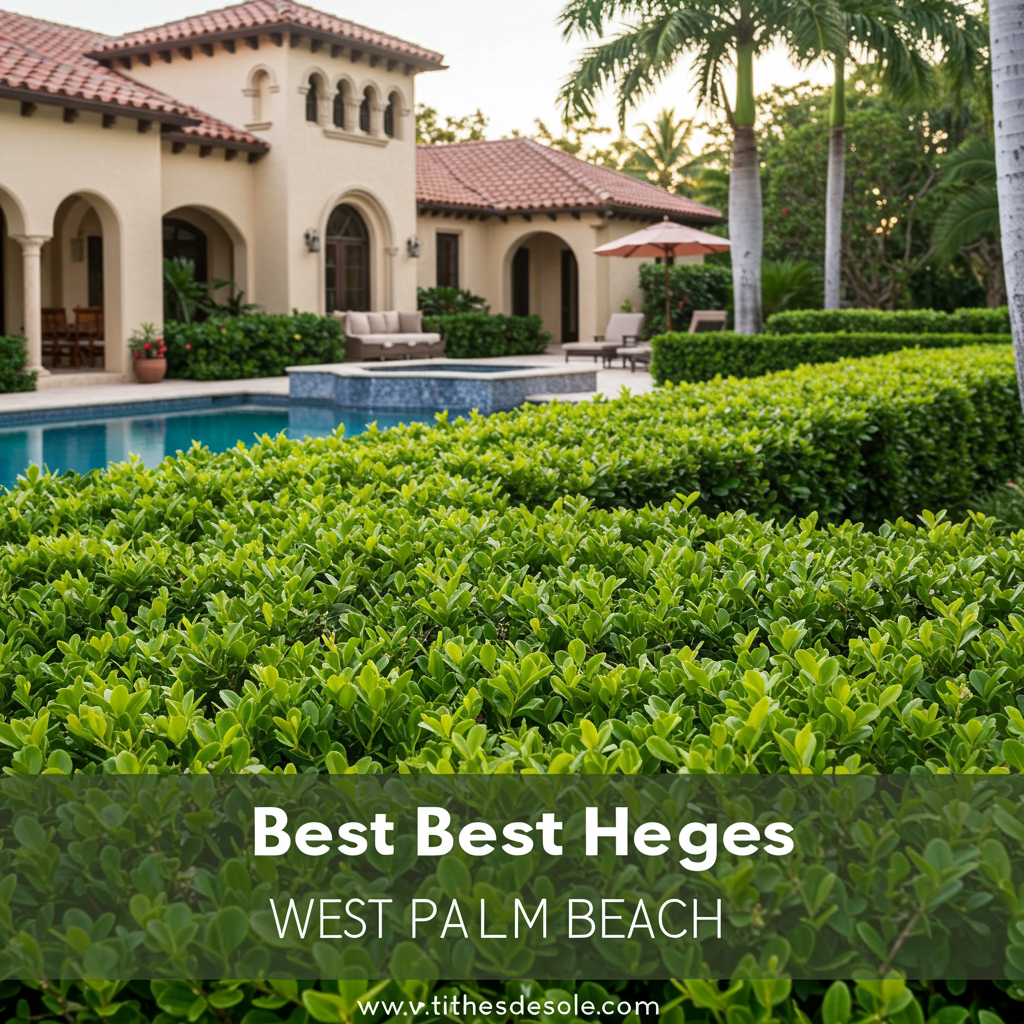Looking to enhance your outdoor living space with natural barriers, vibrant greenery, or added privacy? Discover the Best Hedges West Palm Beach has to offer, from classic privacy screeners to beautiful flowering options, perfectly suited for the South Florida climate.
West Palm Beach, with its vibrant sunshine and tropical climate, offers a unique opportunity to cultivate stunning landscapes. Hedges are a fantastic way to define property lines, create serene private spaces, reduce noise, and add significant beauty to your home. But with so many options, choosing the right hedge for your specific needs and the local environment can be a challenge. This guide will walk you through the top hedge choices that thrive in West Palm Beach, along with essential tips for selection and care.
Why Choose Hedges for Your West Palm Beach Landscape?

Hedges offer more than just aesthetic appeal; they provide a multitude of practical benefits that can transform your property:
Enhanced Privacy: Create a natural barrier against prying eyes, making your outdoor space a private sanctuary.
Property Value Increase: Well-maintained hedges significantly boost curb appeal and can increase a home’s market value.
Noise Reduction: Dense foliage can absorb sound, providing a quieter environment, especially in urban areas.
Wind and Sun Protection: Act as natural windbreaks and offer shade, protecting other plants and outdoor living areas.
Defined Boundaries: Clearly mark property lines, offering a more harmonious relationship with neighbors.
Wildlife Habitat: Provide shelter and food for local birds and other beneficial wildlife.
Improved Air Quality: Like all plants, hedges contribute to cleaner air by absorbing carbon dioxide and releasing oxygen.
Crucial Factors When Selecting Hedges in West Palm Beach
Before you dig in, consider these vital factors to ensure your chosen hedge thrives in your unique West Palm Beach environment:
Climate & Sun Exposure: West Palm Beach experiences hot, humid summers and mild winters. Most hedges here will need to be heat and sun-tolerant.
Soil Type: South Florida soils can vary, but many are sandy or alkaline. Choose plants that can adapt to your soil conditions, or be prepared to amend the soil.
Desired Height & Width: How tall and wide do you want your hedge to grow? This will influence plant spacing and selection.
Growth Rate: Do you need a fast-growing privacy screen, or are you happy with a slower, more controlled growth?
Maintenance Requirements: Consider how much time you’re willing to dedicate to pruning, watering, and fertilizing.
Pest & Disease Resistance: Opt for varieties known to be robust against common local pests and diseases to minimize upkeep.
Salt Tolerance: If your property is near the coast, salt tolerance is a non-negotiable factor.
Top Picks: Best Hedges for West Palm Beach
Here are some of the most stunning and reliable hedge options that flourish in the West Palm Beach climate:
Podocarpus (Podocarpus macrophyllus)
Description: An evergreen, dense shrub or small tree, Podocarpus is a classic for Florida hedges. Its slender, dark green leaves give it a refined look.
Why it’s great: Extremely versatile, low-maintenance, drought-tolerant once established, and can be easily shaped for formal or informal hedges. It’s also relatively salt-tolerant.
Growth Rate: Moderate to fast.
Uses: Excellent for privacy screens, property line definition, and formal hedges.
Ficus (Ficus nitida / Ficus microcarpa ‘Green Island’)
Description: Ficus nitida is a popular choice for tall, dense privacy hedges due to its fast growth and lush, glossy green leaves. ‘Green Island’ is a dwarf variety, great for lower, denser hedges.
Why it’s great: Creates an incredibly dense screen very quickly, offering unparalleled privacy.
Growth Rate: Very fast.
Considerations: Requires regular trimming to maintain shape and prevent it from becoming too large. Roots can be aggressive, so plan planting location carefully away from foundations or pipes.
Uses: Tall privacy screens, sound barriers.
Clusia (Clusia guttifera / Clusia rosea)
Description: Known for its thick, leathery, paddle-shaped leaves, Clusia is an incredibly tough and dependable plant. Also called “Autograph Tree” because you can scratch designs into its leaves.
Why it’s great: Hurricane-resistant, highly salt-tolerant, drought-tolerant, and requires minimal care once established. It forms a dense, natural-looking screen.
Growth Rate: Moderate.
Uses: Salt-exposed areas, privacy hedges, natural barriers.
Ligustrum (Ligustrum japonicum / Ligustrum sinense ‘Sunshine’)
Description: Ligustrum varieties are classic hedging plants. Ligustrum japonicum produces glossy, dark green leaves and fragrant white flowers. Ligustrum sinense ‘Sunshine’ offers vibrant golden foliage without flowering, providing a striking color contrast.
Why it’s great: Fast-growing, adaptable to various soil types, and easy to maintain. The ‘Sunshine’ variety adds year-round color.
Growth Rate: Fast.
Uses: Formal or informal hedges, property borders.
Sweet Viburnum (Viburnum odoratissimum)
Description: An evergreen shrub with large, glossy, dark green leaves and clusters of small, fragrant white flowers in spring.
Why it’s great: Creates a dense, attractive screen, offers a beautiful floral display, and is relatively low-maintenance.
Growth Rate: Moderate.
Uses: Privacy hedges, foundation plantings, fragrant borders.
Areca Palm (Dypsis lutescens)
Description: While not a traditional sheared hedge, Areca Palms are excellent for creating a soft, tropical privacy screen. They grow in dense clumps of feathery fronds.
Why it’s great: Provides a lush, tropical look, offers good privacy without feeling too monolithic, and thrives in partial shade to full sun.
Growth Rate: Moderate.
Uses: Tropical privacy screens, natural boundaries, softening harsh lines.
Designing Your West Palm Beach Hedge
Think about the overall look you want to achieve:
Formal vs. Informal: Do you prefer clean, straight lines (formal) or a more natural, flowing look (informal)? Some plants are better suited for specific styles.
Single Species vs. Mixed: While a single species creates uniformity, a mixed hedge can add texture, color, and biodiversity.
Spacing: Proper spacing is crucial. Plant too close, and they’ll compete for resources; too far, and you’ll have gaps. Always follow the recommended spacing for each plant type.
Purpose: Clearly define your primary goal – is it absolute privacy, a soft border, or a decorative element?
Essential Hedge Maintenance in West Palm Beach
Even the hardiest hedges need some care to look their best:
Pruning: Regular pruning is essential to maintain shape, density, and health.
Frequency: Fast-growing hedges like Ficus may need trimming every 4-6 weeks during growing seasons, while slower growers might only need it a few times a year.
Technique: Always use sharp, clean tools. Trim the top narrower than the bottom to allow sunlight to reach the lower foliage.
Watering: Young hedges need consistent watering to establish. Once mature, many West Palm Beach hedges are drought-tolerant but will benefit from deep watering during dry spells.
Fertilization: Feed your hedges with a balanced, slow-release fertilizer 2-3 times a year, typically in spring, summer, and fall, to promote healthy growth.
* Pest and Disease Management: Regularly inspect your hedges for signs of pests or diseases. Addressing issues early can prevent major problems.
Frequently Asked Questions About West Palm Beach Hedges
Q1: How fast do hedges grow in West Palm Beach?
A: Growth rates vary significantly by species and conditions. Fast-growing options like Ficus can add several feet per year, while others like Clusia have a more moderate growth rate of 1-2 feet annually. Consistent watering, fertilization, and ample sunlight also promote faster growth.
Q2: What’s the best time to plant hedges in West Palm Beach?
A: The ideal time to plant hedges in West Palm Beach is during the cooler, drier months, typically from late fall to early spring (October to March). This allows the plants to establish their root systems before the intense summer heat and humidity arrive.
Q3: Are there salt-tolerant hedge options for coastal areas?
A: Yes, absolutely! Clusia, Podocarpus, and Green Buttonwood are excellent choices for areas exposed to salt spray or salty soil conditions. These plants have evolved to withstand harsh coastal environments.
Q4: How often should I prune my hedges?
A: It depends on the hedge type and your desired look. Fast-growing privacy hedges (like Ficus) might need pruning monthly during the active growing season (spring/summer). Slower-growing, more informal hedges might only require pruning once or twice a year. Regular, light pruning is often better than infrequent, heavy cuts.
Q5: Can hedges increase my property value?
A: Yes, well-maintained, attractive hedges significantly enhance curb appeal, provide privacy, and define boundaries, all of which contribute positively to a property’s market value. Living landscapes are a highly sought-after feature for homebuyers.
Conclusion: Elevate Your Outdoor Space with the Perfect West Palm Beach Hedge
Choosing the best hedges West Palm Beach has to offer is an investment in your property’s beauty, privacy, and long-term value. By considering your specific needs, the unique climate, and the excellent options available, you can create a stunning and thriving green masterpiece that will be the envy of the neighborhood. With a little planning and consistent care, your West Palm Beach hedge will flourish, providing years of enjoyment and a truly elegant outdoor living space.

